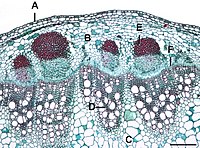
Photo from wikipedia
Plant growth and development rely heavily on cyclins, which compose an important class of cell division regulators. D-type cyclins (CYCDs) are responsible for the rate-limiting step of G1 cells. In… Click to show full abstract
Plant growth and development rely heavily on cyclins, which compose an important class of cell division regulators. D-type cyclins (CYCDs) are responsible for the rate-limiting step of G1 cells. In the plant kingdom, despite the importance of CYCDs in herbaceous plants, there is little knowledge of these proteins in perennial woody plants. Here, a nucleus-localized cyclin gene, PsnCYCD1;1, was cloned from Populus. PsnCYCD1;1 was highly expressed in tissues with active cell division, especially the leaf buds, and could be induced by sucrose and phytohormones. Moreover, overexpression of PsnCYCD1;1 in poplar could stimulate cell division, resulting in the generation of small cells and causing severe morphological changes in the vascular bundles, resulting in "S"-shaped tortuous stems and curled leaves. Furthermore, transcriptomic analysis revealed that endogenous genes related to cell division and vascular cambium development were significantly upregulated in the transgenic plants. In addition, PsnCDKA1, PsnICK3 and PsnICK5 were identified as interacting proteins of PsnCYCD1;1 according to yeast two-hybrid (Y2H) and bimolecular fluorescence complementation (BiFC) assays. Our study demonstrates that PsnCYCD1;1 accelerates plant cell division and participates in secondary growth of vascular bundles in poplar.
Journal Title: Journal of experimental botany
Year Published: 2023
Link to full text (if available)
Share on Social Media: Sign Up to like & get
recommendations!